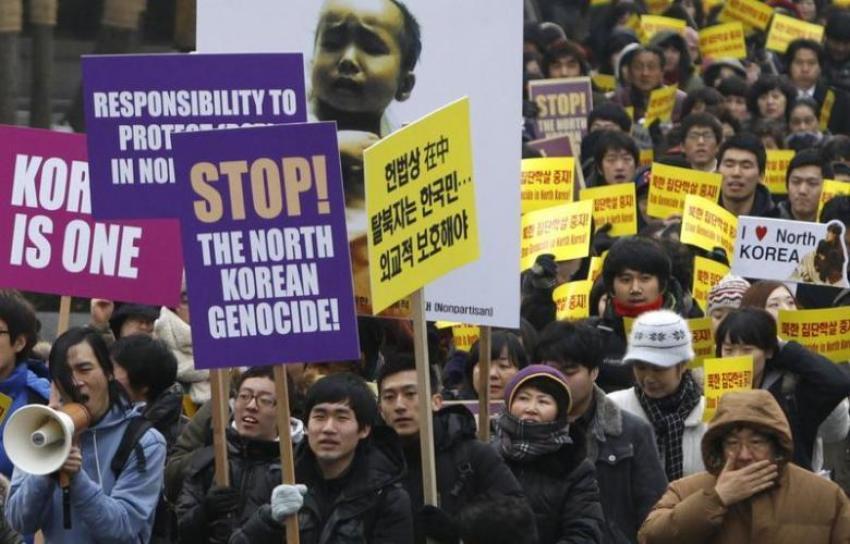North Korea Must Face Justice for Torture, Sexual Slavery, Killings of Christians and Others: Groups

A global alliance of human rights groups is backing efforts to hold North Korea responsible for the crimes against humanity being carried out against Christians and hundreds of thousands of other prisoners inside the secretive regime.
"Essentially, North Korea is the most oppressive regime in the world; it is certainly the most closed, isolated country in the world. It's a regime that stands accused by the U.N.'s own Commission of Inquiry of crimes against humanity," Benedict Rogers, East Asia Team Leader at Christian Solidarity Worldwide, told The Christian Post in a phone interview on Thursday.
"Those crimes against humanity include the incarceration of 100,000 to 200,000 prisoners, who are jailed because of political crimes, and are subjected to the worst forms of torture, slave labor, denial of medical care, sexual violence, and in some instances execution."
CSW is part of the International Coalition to Stop Crimes Against Humanity in North Korea, which is backing renewed efforts — specifically two new U.N. reports — to seek accountability and justice for such crimes under Kim Jong Un's regime.
The Group of Independent Experts on Accountability, appointed by the U.N. High Commissioner for Human Rights at the request of the U.N. Human Rights Council, said that it is "critical" to push forward measures that will expose the extent of the abuses and is urging for the creation of an "ad hoc international tribunal."
Such a tribunal "would allow the temporal, territorial, personal and subject-matter jurisdiction to be calibrated to meet the needs and aspirations of the victims," said Sonja Biserko, a Serbian human rights activist who served on the U.N. Commission of Inquiry into human rights in North Korea, and Sara Hossain, a lawyer in the Supreme Court of Bangladesh.
Tomas Ojea Quintana, the special rapporteur on Human Rights in the DPRK (North Korea), has also urged "all relevant stakeholders" to act and "to ensure that serious human rights violations, especially those amounting to crimes against humanity, do not go unpunished."
North Korea remains the country where Christians face the most severe persecution for their faith, according to Open Doors and other persecution watchdog groups.
Rogers told CP that he agrees with that ranking. He pointed out that Christians are known to have been executed or routinely punished with long prison sentences if officials find out about their faith, or if they are found to be in possession of a Bible or meeting with other Christians secretively.
"I think the thing that makes North Korea stand out" is that "in most countries where persecution is taking place, Christians can at least exist. Even in very desperate situations, there are churches, they can meet in most places," he pointed out.
"But basically, North Korea is one of very few countries in the world where to be a Christian, to be known to be a Christian, to meet with other Christians to worship is impossible."
Rogers noted that there are four state-sanctioned churches in Pyongyang, the capital, but they are mostly for show for the international community.
He added that it is hard to give an estimate on the number of Christians living in North Korea, given that they are forced to be so secretive in order to survive.
Despite Kim's reluctance to engage with international diplomacy, there are ways to hold his regime accountable and try to lessen the human rights abuses there, Rogers noted.
Besides directives by the U.N. Commission of Inquiry, the U.N. special rapporteur, and the group of experts calling on the larger body to respond to the scale of human rights abuses, he highlighted efforts to break the "communications blockade" in North Korea.
"I think the thing that keeps this regime in power is its propaganda and its control of its own citizens' thinking, and its control of information into the country," Rogers said.
He revealed that radio broadcasts, DVDs, and USB sticks are all being smuggled into the country, with the hope that it will give "ordinary North Koreans a flow of information from the outside world that might begin to challenge the propaganda" they have been fed.
Rogers admitted that there is "no magic wand, no quick fix," but expressed hope that such methods can "pave the way for change."
The Committee for Human Rights in North Korea obtained satellite photos in November 2016 that showed that the country's secretive prisons, where much of the slave labor and executions take place, are expanding in size.
Rogers explained that even outside the prison camps, life for ordinary citizens is harsh, with the songbun system dividing people between the ruling loyal class, the wavering class, and the hostile class.
"It is the loyal class, those who are in the elite who are loyal to the regime who receive all the material benefits, education, health care, employment," he said.
The hostile class — those that are the most oppressed — include not only those suspected of being Christians, whether they are or not, but also people who may be descendants of Christians, even if they themselves are not practicing believers, Rogers described.
"But certainly it's the people inside the prison camps that are enduring the worst forms of human rights abuses," he said.



























